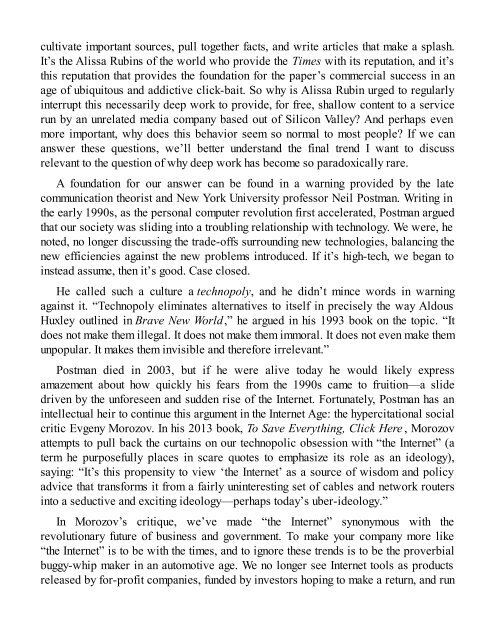Deep Work_ Rules for focused success in a distracted world ( PDFDrive.com )
Create successful ePaper yourself
Turn your PDF publications into a flip-book with our unique Google optimized e-Paper software.
cultivate important sources, pull together facts, and write articles that make a splash.<br />
It’s the Alissa Rub<strong>in</strong>s of the <strong>world</strong> who provide the Times with its reputation, and it’s<br />
this reputation that provides the foundation <strong>for</strong> the paper’s <strong>com</strong>mercial <strong>success</strong> <strong>in</strong> an<br />
age of ubiquitous and addictive click-bait. So why is Alissa Rub<strong>in</strong> urged to regularly<br />
<strong>in</strong>terrupt this necessarily deep work to provide, <strong>for</strong> free, shallow content to a service<br />
run by an unrelated media <strong>com</strong>pany based out of Silicon Valley? And perhaps even<br />
more important, why does this behavior seem so normal to most people? If we can<br />
answer these questions, we’ll better understand the f<strong>in</strong>al trend I want to discuss<br />
relevant to the question of why deep work has be<strong>com</strong>e so paradoxically rare.<br />
A foundation <strong>for</strong> our answer can be found <strong>in</strong> a warn<strong>in</strong>g provided by the late<br />
<strong>com</strong>munication theorist and New York University professor Neil Postman. Writ<strong>in</strong>g <strong>in</strong><br />
the early 1990s, as the personal <strong>com</strong>puter revolution first accelerated, Postman argued<br />
that our society was slid<strong>in</strong>g <strong>in</strong>to a troubl<strong>in</strong>g relationship with technology. We were, he<br />
noted, no longer discuss<strong>in</strong>g the trade-offs surround<strong>in</strong>g new technologies, balanc<strong>in</strong>g the<br />
new efficiencies aga<strong>in</strong>st the new problems <strong>in</strong>troduced. If it’s high-tech, we began to<br />
<strong>in</strong>stead assume, then it’s good. Case closed.<br />
He called such a culture a technopoly, and he didn’t m<strong>in</strong>ce words <strong>in</strong> warn<strong>in</strong>g<br />
aga<strong>in</strong>st it. “Technopoly elim<strong>in</strong>ates alternatives to itself <strong>in</strong> precisely the way Aldous<br />
Huxley outl<strong>in</strong>ed <strong>in</strong> Brave New World,” he argued <strong>in</strong> his 1993 book on the topic. “It<br />
does not make them illegal. It does not make them immoral. It does not even make them<br />
unpopular. It makes them <strong>in</strong>visible and there<strong>for</strong>e irrelevant.”<br />
Postman died <strong>in</strong> 2003, but if he were alive today he would likely express<br />
amazement about how quickly his fears from the 1990s came to fruition—a slide<br />
driven by the un<strong>for</strong>eseen and sudden rise of the Internet. Fortunately, Postman has an<br />
<strong>in</strong>tellectual heir to cont<strong>in</strong>ue this argument <strong>in</strong> the Internet Age: the hypercitational social<br />
critic Evgeny Morozov. In his 2013 book, To Save Everyth<strong>in</strong>g, Click Here , Morozov<br />
attempts to pull back the curta<strong>in</strong>s on our technopolic obsession with “the Internet” (a<br />
term he purposefully places <strong>in</strong> scare quotes to emphasize its role as an ideology),<br />
say<strong>in</strong>g: “It’s this propensity to view ‘the Internet’ as a source of wisdom and policy<br />
advice that trans<strong>for</strong>ms it from a fairly un<strong>in</strong>terest<strong>in</strong>g set of cables and network routers<br />
<strong>in</strong>to a seductive and excit<strong>in</strong>g ideology—perhaps today’s uber-ideology.”<br />
In Morozov’s critique, we’ve made “the Internet” synonymous with the<br />
revolutionary future of bus<strong>in</strong>ess and government. To make your <strong>com</strong>pany more like<br />
“the Internet” is to be with the times, and to ignore these trends is to be the proverbial<br />
buggy-whip maker <strong>in</strong> an automotive age. We no longer see Internet tools as products<br />
released by <strong>for</strong>-profit <strong>com</strong>panies, funded by <strong>in</strong>vestors hop<strong>in</strong>g to make a return, and run



